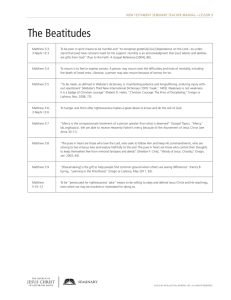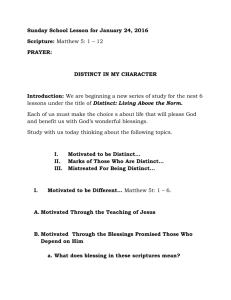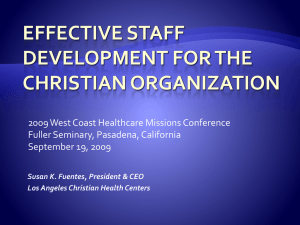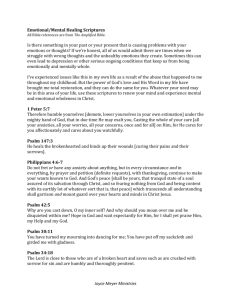GCC_AdultEquipping_BringingTheGospelHome_Lesson1
advertisement
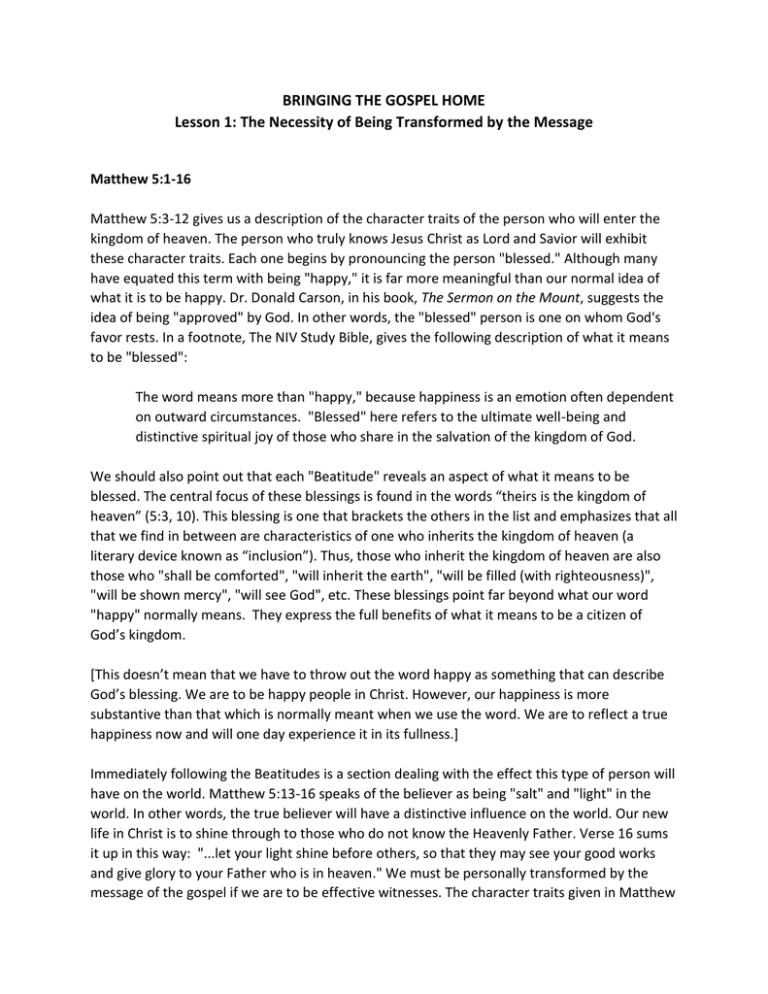
BRINGING THE GOSPEL HOME Lesson 1: The Necessity of Being Transformed by the Message Matthew 5:1-16 Matthew 5:3-12 gives us a description of the character traits of the person who will enter the kingdom of heaven. The person who truly knows Jesus Christ as Lord and Savior will exhibit these character traits. Each one begins by pronouncing the person "blessed." Although many have equated this term with being "happy," it is far more meaningful than our normal idea of what it is to be happy. Dr. Donald Carson, in his book, The Sermon on the Mount, suggests the idea of being "approved" by God. In other words, the "blessed" person is one on whom God's favor rests. In a footnote, The NIV Study Bible, gives the following description of what it means to be "blessed": The word means more than "happy," because happiness is an emotion often dependent on outward circumstances. "Blessed" here refers to the ultimate well-being and distinctive spiritual joy of those who share in the salvation of the kingdom of God. We should also point out that each "Beatitude" reveals an aspect of what it means to be blessed. The central focus of these blessings is found in the words “theirs is the kingdom of heaven” (5:3, 10). This blessing is one that brackets the others in the list and emphasizes that all that we find in between are characteristics of one who inherits the kingdom of heaven (a literary device known as “inclusion”). Thus, those who inherit the kingdom of heaven are also those who "shall be comforted", "will inherit the earth", "will be filled (with righteousness)", "will be shown mercy", "will see God", etc. These blessings point far beyond what our word "happy" normally means. They express the full benefits of what it means to be a citizen of God’s kingdom. [This doesn’t mean that we have to throw out the word happy as something that can describe God’s blessing. We are to be happy people in Christ. However, our happiness is more substantive than that which is normally meant when we use the word. We are to reflect a true happiness now and will one day experience it in its fullness.] Immediately following the Beatitudes is a section dealing with the effect this type of person will have on the world. Matthew 5:13-16 speaks of the believer as being "salt" and "light" in the world. In other words, the true believer will have a distinctive influence on the world. Our new life in Christ is to shine through to those who do not know the Heavenly Father. Verse 16 sums it up in this way: "...let your light shine before others, so that they may see your good works and give glory to your Father who is in heaven." We must be personally transformed by the message of the gospel if we are to be effective witnesses. The character traits given in Matthew 5:3-12 are an excellent place to begin. The Christian will be characterized by each of the following character traits to one degree or another. To be effective witnesses, we must be continually growing in each of these areas. Poor in spirit: The one who is "poor in spirit" is one who realizes his/her spiritual bankruptcy. We could say that it means to be a spiritual beggar. Therefore, it is one who is completely destitute spiritually and must cry out to God for help. Poverty of spirit means we realize we are completely dependent upon God spiritually. This is to be an ongoing characteristic of the Christian. Even though we are now in Christ and are new creations, we must never forget that our new life is the result of the grace, mercy, and undeserved love of God (Isaiah 6:1-8; Luke 18:10-14; Ephesians 2:1-8). Those who mourn: This is a counterpart to poverty of spirit. The person who realizes his/her spiritual poverty will certainly mourn over the ugliness of sin. They will mourn, first of all, over personal sin (Contrast Saul & David in 1 Samuel 15 and Psalm 51). However, they will also mourn over the sins of others (Nehemiah 1; Psalm 119:136; Jeremiah 9:1; 13:17) and over the terrible effects of sin (Lamentations). The bottom line is that we are to be grieved over sin as God is (Genesis 5-6; Isaiah 53:3; Matthew 26:38; Luke 19:41-44). Meek: Meekness is again closely related to poverty of spirit. While poverty of spirit deals primarily with one's spiritual assessment of himself with respect to God, meekness has more to do with our relationship to God and other people. Meekness is the response of the one who knows what it is to be poor in spirit and to mourn over sin. The meek person looks more to the interests of others than his own personal interest. It is a Spirit-empowered gentleness that flows from true humility and selflessness before God and others (Galatians 5:22-23; 2 Corinthians 10:1ff.) Those who hunger and thirst for righteousness: The first three Beatitudes can be considered an emptying of the Christian. However, the one who has experienced this type of emptying develops a new hunger. It is a hunger and thirst to be conformed to the will of God. Conforming to God's will becomes as necessary as our daily food and drink. And God's promise is that this person who has this type of God-honoring hunger will have that hunger satisfied. (Psalm 63; Philippians 3). Merciful: Mercy is a loving response prompted by the misery and need of others. It is to have a Spirit-empowered, Christlike compassion for others that is expressed in taking action to meet their needs with the resources God has given to us. For the Christian, mercy includes not only being merciful in a physical sense, but doing this with the goal of seeing others come to know the mercy of God. If we do not keep this eternal focus on our deeds of mercy, we become nothing more than social workers. (Matthew 9:35-38; Luke 10:25-37; Luke 14:12-14; Acts 2:4247; 3:1-10; 4:32-5:11; 2 Corinthians 1:3-11; 8:1-9) Pure in heart: This character trait speaks of true inner purity. It describes a true desire to remain pure before our Lord, not just in actions, but in attitudes and motives. God looks on the heart and the "pure in heart" are primarily concerned with what God sees in their hearts and not just what people see on the outside. (Genesis 6:5; Jeremiah 17:9-10 Matthew 15:1-20; Deuteronomy 6:4; 10:16; Psalm 24:3-4; 86:11; Proverbs 4:20-27; Ezekiel 36:25-26; Matthew 23:25-28; Titus 2:11-14; Hebrews 12:14; Psalm 119:9-11; 2 Corinthians 3:18; Ephesians 1:15-23; 3:14-21; Philippians 4:8; Hebrews 9:13-14; James 4:1-10; 1 John 1:9; 3:1-3) Peacemakers: The Christian is one who is to be a true peacemaker. People should be able to look to us to find help in dealing with personal conflict and a lack of peace in their hearts. However, peacemaking includes much more than just pursuing the absence of conflict or having a pleasant feeling within. It is a positive term which includes the ultimate aspect of peace, peace with God. Christians must be peacemakers in the deepest sense of carrying the message of peace with God in Jesus Christ. Our desire to see peace between people must be fueled by the desire to see people at peace with God. (Romans 5:1-11; 2 Corinthians 5:11-21; Romans 12:18; 14:19; Ephesians 4:1-6) Those who are persecuted: Couldn't we just leave this one out? This is the Beatitude that gets the least amount of attention. It is pretty easy to consider the others as necessary, but this one? However, persecution is inevitable for the one who wholeheartedly loves the Lord. If the other seven character traits are present (which they are to some degree in every true believer), then this one will also be present. The authentic Christian life comes into conflict with this world that is bathing in sin. The world's normal reaction to holiness is hostility. One very important point should be emphasized here: This Beatitude speaks of being persecuted "because of righteousness" and "because of Me (Christ)." We must make a distinction between being persecuted for obnoxiousness sake and being persecuted for the sake of righteousness. We also must make the connection between rejoicing and persecution that these verse make. We are to rejoice because we know it is worth it when we keep our eyes fixed on our ultimate reward. (John 15:18-20; Acts 14:22; 2 Timothy 3:12; 2 Corinthians 12:10)
